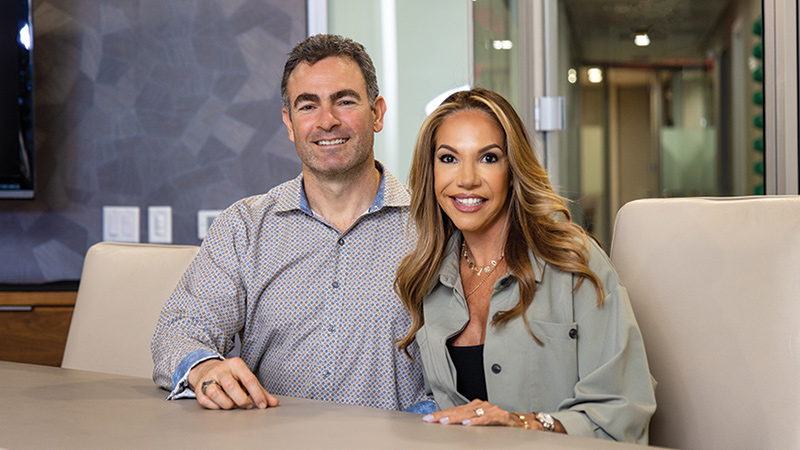Heart disease is the number one cause of death worldwide. While individuals can protect their heart by changing their behavior (eat a balanced diet, for example) or their environment (avoid polluted air), they can’t directly alter their risk for developing coronary artery disease (CAD) if that risk is encoded in their DNA.

Philanthropic spouses David S. Vogel and Thais Lopez Vogel believe genomic science can provide humans an edge. So, when they learned about the Prospective Electronic Polygenic Risk Study (PEPRS) at Scripps Research, they were eager to lend their support. Through their VoLo Foundation, they provided $1 million to advance the study’s goal: identify individuals who carry a genetic risk for CAD then calculate that risk as low, intermediate or high—better equipping them to make informed healthcare decisions.
“Current practices in medicine are largely reactive: we respond to diseases after they develop, while putting little emphasis on preventing disease in the first place,” says David. “We chose to partner with Scripps Research because of how they are applying innovative, data-driven science to improve healthcare.”
David himself is a data scientist, with degrees from MIT and New York University, and has earned international recognition for his predictive modeling accuracy. He has applied his expertise as the founder and CEO of Voloridge Investment Management LLC, a quantitative hedge fund overseeing billions of dollars.
Thais, a native of Venezuela, received her law degree from Universidad Católica Andrés Bello and worked as an attorney before meeting and marrying David in 2007. Their blended family now includes six children, so concerns about their future—the environment they’ll grow up in and the availability of quality healthcare— are top of mind.
“I believe we have a responsibility to future generations,” says Thais, “and David and I are committed to doing what we can to give them—our kids and others—a better world.”
Together, David and Thais launched VoLo Foundation in 2014. VoLo supports data- driven research projects that focus primarily on solutions to climate change but also on novel approaches to improving human health. One initiative even combines the two: it is exploring how longevity and wellness are impacted by climate change.
The PEPRS project is part of the larger MyGeneRank study at the Scripps Research Translational Institute, a division of Scripps Research. Participants in MyGeneRank contribute genetic data they receive from 23andMe (which is then anonymized) and answer surveys about their health and activities. Using current knowledge about the 168 genetic markers associated with CAD, scientists at the institute use an algorithm to calculate individual risk for developing the disease. MyGeneRank will soon begin predicting genetic risk for other conditions, including glaucoma.
The Vogels see great value in this data-driven science. “The PEPRS study is the epitome of research that I believe will advance a major transformation in healthcare, and I hope that it delivers much-needed evidence that data-driven healthcare based on innovative technologies can be cost-effective, yet hugely beneficial to patients,” says David.
Ali Torkamani, professor and director of Genomics and Genome Informatics at the Scripps Research Translational Institute, leads MyGeneRank and appreciates the ongoing support of VoLo Foundation. “Polygenic risk scores can be incredibly useful and affordable tools to guide preventative health decisions,” he says. “What we’ve seen is that participants in PEPRS who learned they were at high genetic risk for developing CAD were much more likely to start using statins or other cholesterol-lowering therapies. So, the study is having a direct impact on people’s health. Now, VoLo Foundation is making it possible for us to expand these studies in a way that is going to be very meaningful for the human population.”
Thais says the foundation works as a bridge between scientists and the public. “We’re thrilled to help drive the future of genomic medicine.”
Know the score
Want to learn more about genomic science and how you can participate?
Visit mygenerank.scripps.edu.